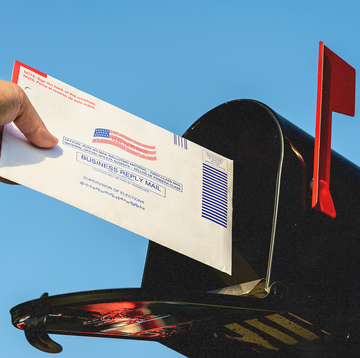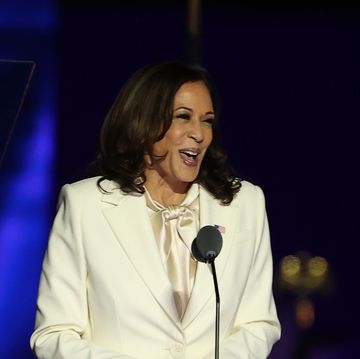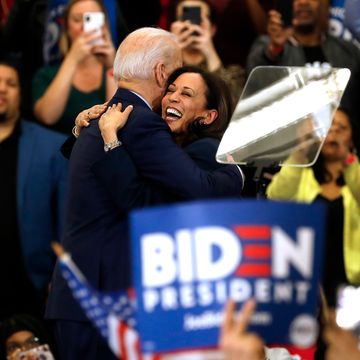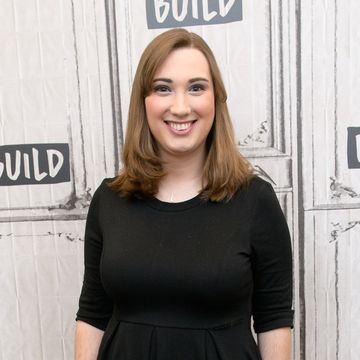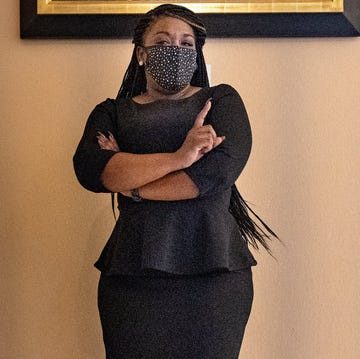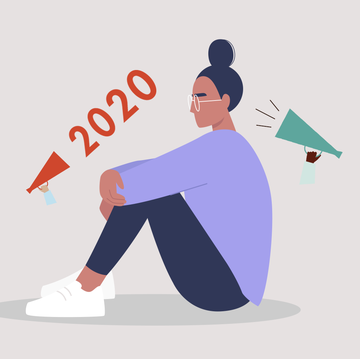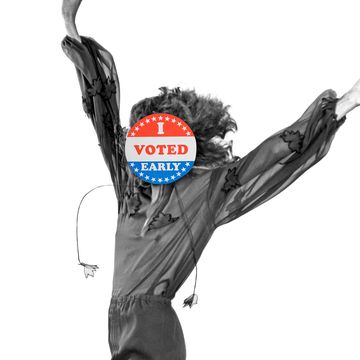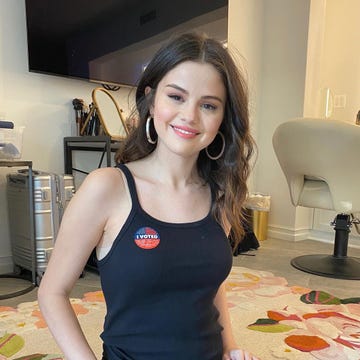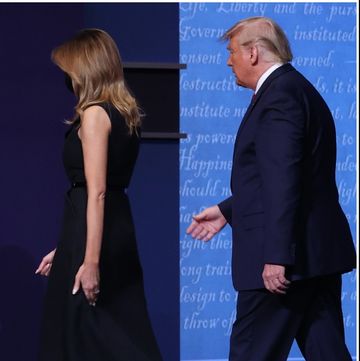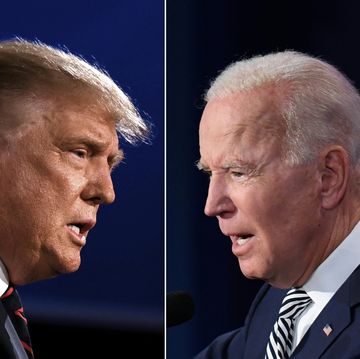Gloria Steinem is a journalist, author, activist, and feminist leader. She co-founded Ms. magazine and the Women's Media Center and was the subject of the recent HBO documentary Gloria: In Her Own Words. She shares her thoughts about why you should vote on November 4.
If your friends say, "My vote doesn't count," or, "Politics are dirty," it's no wonder. Many forces profit from the unequal pay and status of women, and ever since the civil rights movement and the women's movement created a new majority, they have been trying to convince us that our vote doesn't matter.
You may also be discouraged because voting lines are long, polling places far away, and responsibility for kids and jobs makes voting difficult. Some state officials also create barriers of voter identification — especially for the poor, voters of color, students, and other forces of change. That's part of the reason that voter turnout in this country is lower than in, say, India, with all its problems of poverty and illiteracy. In fact, our country makes voting more difficult than any other democracy.
In non-presidential years like this one, turnout is even lower because the media tend to focus on the White House. This creates the very real danger that the majority of Americans — who believe that women, not the government, should make reproductive decisions about our own bodies — will let unrepresentative anti-choice state legislatures go right on shutting down clinics, as in Texas and Mississippi. Also many or most state legislatures will go right on using our tax dollars to support profit instead of equal pay, and redistricting themselves into perpetuity — including in Washington.
All this is why we must not only vote but be willing to fight to vote — not only for who goes to Washington, but also for our school board and state legislature. #CosmoVotes and many other websites will give you the facts so you can vote for representatives who vote for you. I want to tell you a story.
At the beginning of the 1980s, I went to Missouri to campaign for Harriett Woods, then the only Democratic woman to run for U.S. Senate. She was a great candidate, and her path into politics had been so improbable that no one could have made it up. As a mother of two young children, she complained about a noisy manhole cover that woke them up every time a car rolled over it in her otherwise quiet street. After getting nowhere with the city council, she circulated a petition to close the street to cars. It worked. This success led her to run for the city council. She won, served eight years, got appointed to the state highway commission. Then she ran a successful race for the state legislature, and was re-elected there too. This also made her the much-loved host of a local television show, and a popular candidate statewide.
Still, when the Democratic Party was choosing a candidate for the U.S. Senate primary, it backed a well-to-do guy with no political experience except writing checks. After all, no woman had ever won a statewide office in Missouri. However, Woods turned out have something more important than her party's blessing: community support and volunteers. She beat the rich guy two-to-one.
Suddenly, she was in a race against Republican John Danforth, not only the incumbent U.S. senator, but a former attorney general of Missouri, an ordained Episcopal priest, and the wealthy grandson of the founder of Ralston Purina. It was as if she were running against the entire patriarchy. Also Missouri was thought to be an anti-choice state, yet Woods refused to budge from her principled position in support of reproductive freedom as a human right.
Still, she was winning in rural Republican areas — even one known as Little Dixie. Then with only a week to go, she ran out of money, and couldn't answer the last-minute storm of television attack ads. She lost by less than 30,000 votes out of more than a million and a half.
However, a righteous race can inspire other victories, even in defeat. It was so clear that her loss was due only to money that it caused the founding of EMILY's List, a political action committee supporting pro-equality women. It would become the single biggest such resource in the nation.
Yet Danforth did win. He took with him to Washington and his Senate staff an African-American lawyer who, in St. Louis, had worked for Monsanto, the agrochemical giant that gave us Agent Orange and now genetically engineered seeds. His name was Clarence Thomas. Danforth explained that he was very attracted to him because both men were conservatives and had studied to be priests.
All this happened nearly three decades ago. Woods herself later became head of the National Women's Political Caucus, and in 2007, she died from leukemia at the age of 79. Nonetheless, the impact of this one woman's electoral loss is with us still.
Remember the parable of the nail: "For want of a nail, the horseshoe was lost; for want of a horseshoe, the horse was lost; for want of a horse, the battle was lost; for want of a battle, the war was lost."
This should be our mantra — and your vote is the nail. Indeed, the voting booth is the one place on earth where the least powerful are equal to the most powerful.
Here is why:
* If Harriett Woods had won, Danforth wouldn't have gone to Washington as U.S. senator.
* If Danforth hadn't returned to Washington, he couldn't have taken Clarence Thomas with him on his Senate staff.
* If Clarence Thomas hadn't been a visible in Washington as a rare African-American conservative willing to go against the majority views of other African-Americans, he wouldn't have been appointed by President George H.W. Bush to head the Equal Employment Opportunities Commission.
* If Clarence Thomas hadn't headed the EEOC, he couldn't have dismantled its class action powers against discrimination, or been rewarded with an appointment to the D.C. Court of Appeals.
* If he hadn't been appointed as a judge, President George H.W. Bush wouldn't have nominated him to replace the great civil rights advocate Supreme Court Justice Thurgood Marshall.
* If Clarence Thomas hadn't been confirmed by the Senate Judiciary Committee — after narrowly surviving accusations of his sexual harassment of Anita Hill — he wouldn't have been appointed to the Supreme Court.
* If he hadn't been on the Supreme Court, he wouldn't have supplied the one-vote margin that halted the recount of votes in Florida — thus giving the U.S. presidency to George W. Bush. (A post-election examination of uncounted ballots commissioned by 12 major news organizations confirmed that former Vice President Al Gore would have won Florida, and thus the U.S. presidency.)
* If George W. Bush hadn't been president, he couldn't have manipulated evidence to justify the U.S. invasion of oil-rich Iraq — and events still flowing from two Iraq wars plus its occupation by U.S. troops would have been absent.
* If Al Gore had become president, U.S. actions on global warming and the environment would have been very different, and … well, I could go on, but you get the idea.
Due to the absence of just a few votes, each of us can count the differences in our lives, our nation, and our world.
Yes, voting isn't the most we can do — but it is the least. Our vote is our voice.
This is part of Cosmopolitan.com's midterm election coverage. Share this article with #CosmoVotes and make sure to vote on November 4.
Follow Gloria on Twitter.


